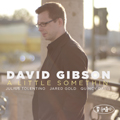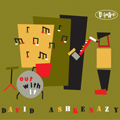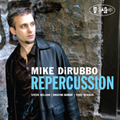www.allaboutjazz.com
If Posi-Tone Records was a major league baseball team, it would be at the top of its division. So far in 2009, the label has had big wins with Sam Yahel‘s piano trio debut Hometown and guitarist Yotam Silberstein‘s overall debut Next Page, not to mention former Ray Charles sideman, trumpeter Jim Rotondi‘s heartfelt tribute to his former leader, Blues for Brother Ray.
Now Posi-Tone sends three sax players—two tenors, one alto—to the plate, and the result is back-to-back-to-back home runs.
 Mike DiRubbo
Mike DiRubbo
Repercussion
Posi-Tone Records
2009
Choosing vibraphonist Steve Nelson for a primary foil may not be exactly traditional, but Mike DiRubbo (the aforementioned alto player) most certainly is. That’s not surprising, given that his mentor and instructor was Jackie McLean. There’s never a sense of struggle or angst in DiRubbo’s approach, even though lively originals like “Lunar” and the title track offer opportunities for such expressions. Instead, DiRubbo projects a marvelous sense of self-assurance as he happily shares space with Nelson. In turn, Nelson practically glows with lyricism on Dave Brubeck‘s “The Duke” and takes a well-deserved spotlight on the soaring “Nelsonian.”
Repercussion was the last session Tony Reedus worked before his untimely death in 2008, and the drummer couldn’t have left a better impression. His foundation work and interplay with bassist Dwayne Burno is flawless, and Reedus’ out-solo on the title track rolls and thunders over Nelson and Burno’s relentless vamp. DiRubbo’s been playing and recording for over 15 years, so he’s no rookie. That said, there’s a youthful exuberance underlying DiRubbo’s classic approach, and that’s the kind of spark jazz needs to keep moving in the 21st century. Repercussion has no frills—that is, there is no wasted motion or unnecessary histrionics. It’s just good clean jazz, and the 21st century needs that, too.
 Ralph Bowen
Ralph Bowen
Dedicated
Posi-Tone Records
2009
Ralph Bowen‘s best quality as a tenor player is said to be his “casual perfectionism.” Maybe that’s true, but there’s nothing casual about Dedicated, a collection of musical shout-outs to the mentors that helped shape Bowen’s sound and career—a roster that includes Eugene Rousseau (one of Bowen’s instructors at the University of Indiana) and legendary saxman (and fellow Canadian) Pat LaBarbera. Rousseau’s tribute, “E.R.,” features Bowen in the clear, playing mournfully longing saxophone guaranteed to break hearts, while “Pat” has bassist John Patitucci flying acrobatics as drummer Antonio Sanchez serves up a juicy counter to Bowen’s cascading solo. That this music is about people that matter to Bowen can’t be disputed; “casual” doesn’t enter into the equation.
Bowen’s foil—guitarist Adam Rogers—evokes Charles Lloyd‘s partnership with John Abercrombie in the late 1990s. Rogers eschews laser-guided effects in favor of a traditional approach that buoys the session. His passion on “Canary Drums” accentuates Bowen’s estimable presence; and Rogers jumps and shouts on “Qaiyam” while Patitucci thoroughly crushes the hard-bop bass line. Bowen teams with trumpeter Sean Jones on the appropriately titled “Mr. Bebop” to bring sparkling colors to the best track on the disc. Unfortunately, while all the music on Dedicated is terrific, Jones’ cameo on “Bebop” begs the question whether he could have made the other tracks sound even better.
 Sean Nowell
Sean Nowell
The Seeker
Posi-Tone Records
2009
Instead of The Seeker, Sean Nowell could have used “New York Vibe” as the title for his second Posi-Tone disc. The blistering opening track oozes Big Apple attitude, though not from the current century. The feeling is closer to a mid-20th century Apple, with Checker cabs flying across the Brooklyn Bridge and candle-lit supper clubs thick with cigarette smoke. Nowell’s bold, snarling tenor could have easily come from that era, and Art Hirahara’s percussive piano is just as muscular. Together they bring an uncompromising East Coast mindset to flame-throwing Nowell originals and timeless standards.
It’s not all strolls down the sidewalks of Noo Yawk. Cellist Dave Eggar sends the East Coast vibe into a Middle Eastern direction with a mystical version of the Yiddish traditional “Oy Matze Matze.” Eggar also brings out the loss in a melancholy opening section of Lennon & McCartney’s “I Will,” and contributes exquisite harmony to to Nowell’s own “Jamie’s Decision.” (Nowell takes the harmony a step further by double-tracking himself on flute.)The Seeker is like a Mariano Rivera fastball: it flies right down Broadway, daring anyone to try and lay a bat on it. That won’t happen, because there’s nothing to do but nod in admiration as the ball flies by, straight and true.
Tracks and Personnel
Repercussion
Tracks: Repercussion; The Duke; Lunar; Highbridge Lullaby; Nightfall; Deja Vu; Too Late Now; Nelsonian; Pisces Rising.
Personnel: Mike DiRubbo: alto sax; Steve Nelson: vibes; Dwayne Burno: bass; Tony Reedus: drums.
Dedicated
Tracks: Canary Drums; Pat; Qaiyam; Mr. Bebop; Prof; E.R.
Personnel: Ralph Bowen: tenor sax; Adam Rogers: guitar; John Patitucci: bass; Antonio Sanchez: drums; Sean Jones: trumpet (4).
The Seeker
Tracks: New York Vibe; You Don’t Know What Love Is; Oy Matze Matze; Dunavski Park; Jamie’s Decision; For All Intensive Purposes; I Will; I Remember You.
Personnel: Sean Nowell: tenor sax, clarinet, flute; Art Hirahara: piano; Thomas Kneeland: bass; Joe Abbantantuono: drums; Dave Eggar: cello (3, 5, 7); Nir Felder: guitar (6).








 Sean Nowell
Sean Nowell